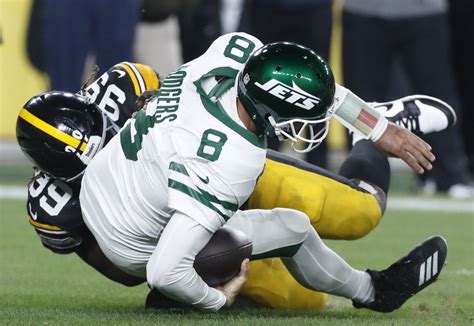
Former NFL quarterback and current ESPN analyst Dan Orlovsky has strongly criticized the Pittsburgh Steelers’ reported interest in acquiring Green Bay Packers quarterback Aaron Rodgers, labeling the idea as “insanity” and questioning the logic behind pursuing a quarterback with Rodgers’ age and contract status when the team has pressing needs at other positions.
PITTSBURGH – The Pittsburgh Steelers’ potential pursuit of Green Bay Packers quarterback Aaron Rodgers has drawn harsh criticism from former NFL quarterback Dan Orlovsky, who described the idea as “insanity.” Orlovsky, now an analyst for ESPN, questioned the Steelers’ priorities, suggesting that the team should focus on rebuilding its roster rather than acquiring an aging quarterback with a substantial price tag.
“That’s insanity, by the way,” Orlovsky said on ESPN’s “Get Up” when discussing the possibility of Rodgers landing in Pittsburgh. “If you are the Pittsburgh Steelers, and you think you’re gonna give up the draft capital and the money it’s gonna take to get Aaron Rodgers so you can win the AFC North…that’s asinine.”
Orlovsky’s comments reflect a growing debate among NFL analysts and fans regarding the Steelers’ offseason strategy. With Ben Roethlisberger retiring after 18 seasons, the team is in search of a new franchise quarterback. However, the path they choose to fill that void is the subject of intense discussion. While some believe that acquiring a proven veteran like Rodgers could provide a short-term boost, others argue that the Steelers should focus on drafting and developing a young quarterback who can lead the team for years to come.
The Steelers’ current quarterback situation includes Mason Rudolph, who has served as Roethlisberger’s backup for several seasons, and Dwayne Haskins, a former first-round pick who joined the team in 2021. Both players have shown flashes of potential, but neither has established himself as a clear-cut starter.
Orlovsky’s criticism centers on the belief that the Steelers have more pressing needs than quarterback. He pointed to the team’s aging offensive line and defense as areas that require immediate attention. “They have to fix the offensive line. The defense is getting older,” Orlovsky stated. “You’re going to gut the rest of your roster to go get [Rodgers]? It makes absolutely no sense.”
The financial implications of acquiring Rodgers are also a significant concern. Rodgers is one of the highest-paid players in the NFL, and the Steelers would likely have to restructure his contract to fit him under their salary cap. This could limit their ability to address other needs on the roster. The Steelers would also have to part with significant draft capital to acquire Rodgers via trade, further hindering their ability to rebuild through the draft.
Orlovsky isn’t alone in his skepticism. Several other analysts have questioned the Steelers’ interest in Rodgers, citing similar concerns about his age, cost, and the team’s other needs. The Steelers have a long and successful history of building through the draft, and many believe that they should stick to that approach rather than making a splashy trade for a veteran quarterback.
The Steelers’ general manager, Kevin Colbert, has acknowledged the team’s need to address the quarterback position this offseason. However, he has also emphasized the importance of building a complete team. “We have to look at all avenues to try to improve our team,” Colbert said at his end-of-season press conference. “That includes the quarterback position, but it also includes every other position on our football team.”
The Steelers’ decision on how to address the quarterback position will have a significant impact on the team’s future. If they choose to pursue Rodgers, they will be betting that he can lead them to a Super Bowl in the next few years. If they choose to draft a young quarterback, they will be taking a longer-term approach, hoping that the player can develop into a franchise cornerstone.
The Steelers have a history of making shrewd personnel decisions, and their approach to the quarterback position this offseason will be closely watched by the rest of the NFL. Whether they ultimately decide to pursue Rodgers or go in a different direction, their decision will be a defining moment for the franchise. The team must weigh the potential benefits of adding a proven veteran against the long-term advantages of building through the draft and developing a young quarterback. The coming months will reveal the Steelers’ strategy and the direction they intend to take as they embark on a new era without Ben Roethlisberger at the helm. The organization’s legacy is built on careful planning and strategic decision-making, and this quarterback decision will undoubtedly be one of the most significant in recent team history.
The Steelers’ quarterback situation is further complicated by the uncertainty surrounding Rodgers’ future. Rodgers has publicly expressed his dissatisfaction with the Packers organization, and it is unclear whether he will ultimately choose to stay in Green Bay, request a trade, or retire. If Rodgers does become available via trade, the Steelers will likely face competition from several other teams, which could drive up the price.
In addition to Rodgers, other potential quarterback options for the Steelers include free agents such as Jameis Winston, Marcus Mariota, and Mitchell Trubisky. The Steelers could also consider drafting a quarterback in the upcoming NFL Draft. However, the draft class is not considered to be particularly strong at the quarterback position, and the Steelers may have to trade up to acquire one of the top prospects.
The Steelers’ decision-making process will also be influenced by their evaluation of Rudolph and Haskins. If the team believes that either player has the potential to be a starter, they may be less inclined to pursue a veteran quarterback. Rudolph has shown flashes of potential in his limited playing time, but he has also struggled with consistency. Haskins, a former first-round pick of the Washington Redskins, is hoping to resurrect his career in Pittsburgh. He has the physical tools to be a successful quarterback, but he needs to improve his decision-making and accuracy.
Ultimately, the Steelers’ quarterback decision will come down to a combination of factors, including their evaluation of the available options, their assessment of their own roster, and their overall strategy for the future. It is a decision that will shape the team’s direction for years to come.
The situation requires a comprehensive evaluation of all potential avenues, balancing immediate competitiveness with long-term sustainability. The front office, coaching staff, and ownership must align on a vision that takes into account not only the current state of the team but also the evolving landscape of the NFL. This decision extends beyond the quarterback position, impacting the entire team’s trajectory and potential for success.
The Steelers’ historical reliance on a strong running game and a dominant defense adds another layer of complexity to the quarterback equation. While a star quarterback can elevate a team, the Steelers have traditionally prioritized a balanced approach, emphasizing the importance of all three phases of the game. This philosophy may influence their decision-making process, leading them to favor a quarterback who can effectively manage the game and complement the team’s strengths rather than a quarterback who relies solely on individual brilliance.
Furthermore, the Steelers’ organizational culture, known for its stability and long-term planning, may play a significant role in their quarterback decision. The team has a history of avoiding impulsive moves and prioritizing sustainable success over short-term gains. This approach may lead them to favor a more patient strategy, such as drafting and developing a young quarterback, rather than making a risky trade for a veteran.
The fans, who are known for their unwavering support and passionate engagement, also have a vested interest in the Steelers’ quarterback decision. They crave a return to Super Bowl contention and are eager to see the team find a quarterback who can lead them to the promised land. Their expectations and desires will undoubtedly influence the atmosphere surrounding the team and add pressure to the decision-making process.
The front office must navigate the complexities of player evaluation, contract negotiations, and roster management. The coaching staff must develop a game plan that maximizes the strengths of the chosen quarterback and minimizes their weaknesses. And the players must embrace the new quarterback and work together to build a cohesive and successful team.
The Steelers are at a critical juncture in their history, and their quarterback decision will be a defining moment for the franchise. The team must embrace the challenge with courage, wisdom, and a unwavering commitment to excellence.
In-Depth Analysis:
The Steelers’ potential interest in Aaron Rodgers highlights a broader trend in the NFL, where teams are increasingly willing to make bold moves to acquire quarterbacks who can elevate their chances of winning a Super Bowl. The Rams’ acquisition of Matthew Stafford, the Broncos’ acquisition of Russell Wilson, and the Browns’ acquisition of Deshaun Watson are recent examples of teams that have traded significant assets to acquire quarterbacks they believe can lead them to championship contention.
However, these moves carry significant risks. The Rams, while winning a Super Bowl, mortgaged their future in the process, accumulating significant dead cap money in the years following their title. The Broncos and Browns acquisitions have yet to produce expected results. Acquiring a quarterback like Rodgers, who is in the twilight of his career, carries the risk of diminishing returns. While Rodgers is still capable of playing at a high level, his age and injury history make him a less reliable long-term investment.
The Steelers must also consider the potential impact on team chemistry. Bringing in a veteran quarterback like Rodgers could disrupt the team’s existing dynamic and create tension between players who have been together for years. The Steelers have a reputation for fostering a close-knit and supportive environment, and they must be careful not to jeopardize that culture.
The Steelers’ decision-making process will be further complicated by the evolving landscape of the NFL. The league is becoming increasingly pass-oriented, and teams need quarterbacks who can make plays with their arms. However, the Steelers have traditionally relied on a strong running game and a dominant defense. They must find a quarterback who can effectively manage the game and complement the team’s strengths rather than a quarterback who relies solely on individual brilliance.
Ultimately, the Steelers’ quarterback decision will be a reflection of their overall philosophy. Are they willing to take a risk to try to win a Super Bowl in the next few years? Or are they more focused on building a sustainable foundation for long-term success? The answer to that question will determine the path they take as they embark on a new era without Ben Roethlisberger.
Background Information:
The Steelers’ quarterback situation is a result of Ben Roethlisberger’s retirement after 18 seasons with the team. Roethlisberger led the Steelers to two Super Bowl victories and established himself as one of the greatest quarterbacks in NFL history. His retirement leaves a significant void in the Steelers’ roster and creates a pressing need to find a new franchise quarterback.
Roethlisberger’s departure marks the end of an era for the Steelers, who have enjoyed remarkable stability at the quarterback position for nearly two decades. Prior to Roethlisberger’s arrival, the Steelers had a long history of quarterback instability, with a revolving door of players failing to establish themselves as long-term starters.
The Steelers’ decision to draft Roethlisberger in 2004 proved to be a franchise-altering move. Roethlisberger quickly established himself as a star, leading the Steelers to a Super Bowl victory in his second season. He went on to have a Hall of Fame career, solidifying his place as one of the greatest quarterbacks in NFL history.
The Steelers’ success during the Roethlisberger era was built on a combination of factors, including his exceptional talent, a strong supporting cast, and a well-coached team. The Steelers consistently fielded a dominant defense and a productive running game, which complemented Roethlisberger’s passing skills and allowed him to thrive.
The Steelers’ organizational culture, characterized by stability, continuity, and a commitment to excellence, also played a significant role in their success. The team has a long history of drafting and developing its own players, and they have consistently emphasized the importance of building a strong foundation for long-term success.
The Steelers’ decision on how to address the quarterback position this offseason will have a significant impact on the team’s future. They must carefully weigh the potential benefits of adding a proven veteran against the long-term advantages of building through the draft and developing a young quarterback.
The Steelers’ historical success has been predicated on a combination of factors, including strong quarterback play, a dominant defense, a productive running game, and a stable organizational culture. As they embark on a new era without Ben Roethlisberger, they must strive to maintain these strengths while also adapting to the evolving landscape of the NFL.
The Steelers’ decision-making process will be closely watched by the rest of the league, as they navigate the challenges of replacing a franchise legend and building a team that can compete for championships for years to come.
Expanded Context:
The debate surrounding the Steelers’ quarterback situation reflects a broader discussion about the value of veteran quarterbacks in the NFL. In recent years, several teams have traded significant assets to acquire veteran quarterbacks, hoping to accelerate their path to championship contention.
The Rams’ acquisition of Matthew Stafford is a prime example of this trend. The Rams traded two first-round picks, a third-round pick, and quarterback Jared Goff to the Lions in exchange for Stafford. The move paid off, as Stafford led the Rams to a Super Bowl victory in his first season with the team.
However, not all of these acquisitions have been successful. The Broncos traded two first-round picks, two second-round picks, and three players to the Seahawks in exchange for Russell Wilson. The Broncos struggled mightily in Wilson’s first season, finishing with a losing record and missing the playoffs.
The Browns traded three first-round picks, a third-round pick, and two other picks to the Texans in exchange for Deshaun Watson. Watson was suspended for 11 games due to allegations of sexual misconduct, and the Browns also struggled in his first season.
These examples highlight the risks associated with acquiring veteran quarterbacks. While a veteran quarterback can provide a short-term boost, there is no guarantee of success. The team must also consider the long-term implications of trading away valuable draft capital.
The Steelers must carefully weigh the potential benefits of acquiring a veteran quarterback against the risks. They must also consider their own roster and their overall strategy for the future. The Steelers have a long history of building through the draft, and they may be hesitant to deviate from that approach.
The Steelers’ decision-making process will also be influenced by the availability of other quarterbacks. If Rodgers is not available via trade, the Steelers may be more likely to pursue other options, such as drafting a quarterback or signing a free agent.
The Steelers’ quarterback situation is a complex one, and there is no easy answer. The team must carefully evaluate all of the available options and make a decision that is in the best long-term interest of the franchise.
Frequently Asked Questions (FAQ):
Q1: Why is Dan Orlovsky criticizing the Steelers’ potential pursuit of Aaron Rodgers?
A1: Dan Orlovsky believes the Steelers should prioritize rebuilding their aging offensive line and defense instead of spending significant draft capital and money on an aging quarterback like Aaron Rodgers. He views the move as “insanity” given the team’s other needs.
Q2: What are the Steelers’ other options at quarterback besides Aaron Rodgers?
A2: The Steelers currently have Mason Rudolph and Dwayne Haskins on their roster. They could also explore free agent options like Jameis Winston, Marcus Mariota, or Mitchell Trubisky. Additionally, they could draft a quarterback in the upcoming NFL Draft.
Q3: What are the potential financial implications of the Steelers acquiring Aaron Rodgers?
A3: Aaron Rodgers is one of the highest-paid players in the NFL. The Steelers would likely have to restructure his contract to fit him under their salary cap, which could limit their ability to address other needs on the roster. They would also have to give up valuable draft picks in a trade.
Q4: What factors will influence the Steelers’ decision on how to address the quarterback position?
A4: Factors influencing the decision include the Steelers’ evaluation of available quarterback options, their assessment of their current roster, their overall strategy for the future, Rodgers’ availability, and their assessment of Mason Rudolph and Dwayne Haskins’ potential.
Q5: How does the Steelers’ historical approach to team building factor into this decision?
A5: The Steelers have a long and successful history of building through the draft and developing their own players. This tradition may make them hesitant to trade away valuable draft capital to acquire a veteran quarterback, even one as accomplished as Aaron Rodgers, and prefer a more patient approach.









